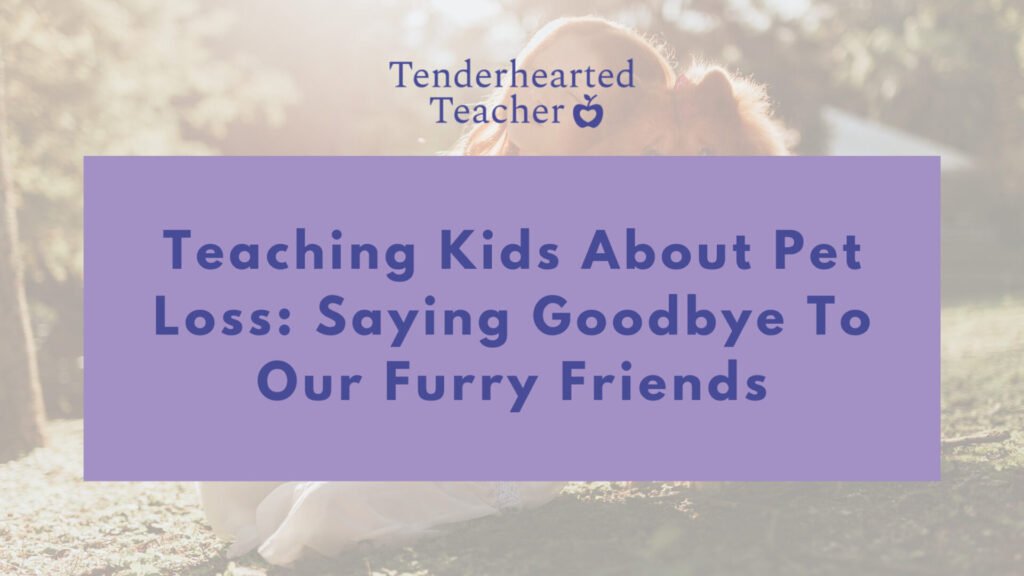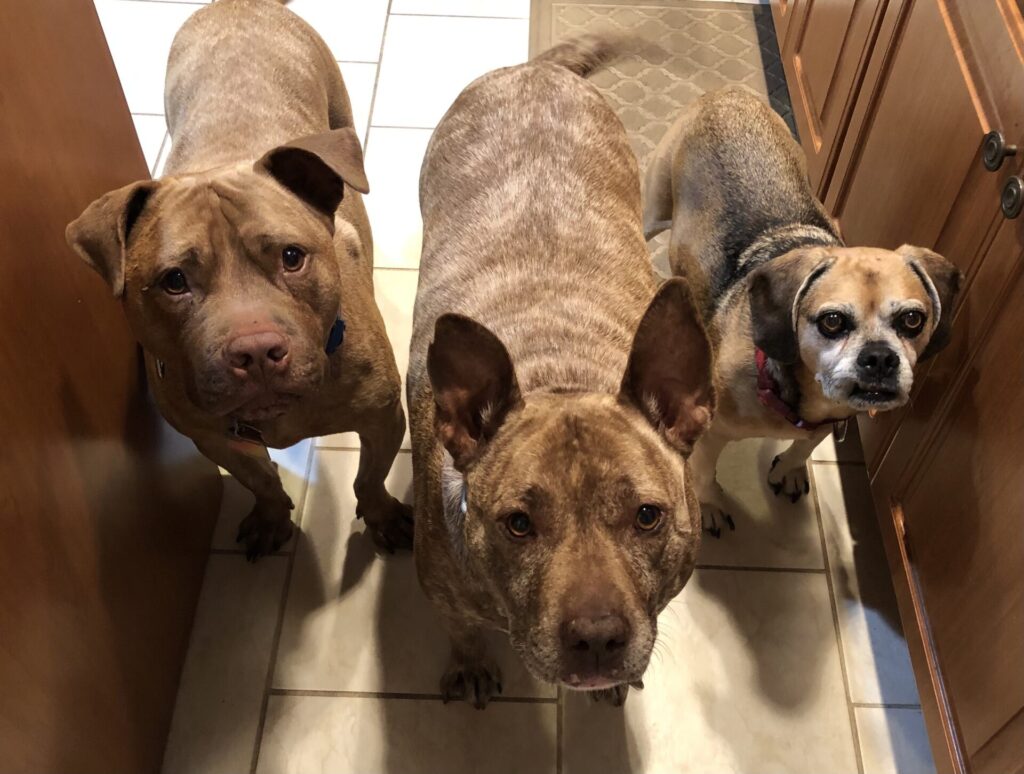
Author's Note: This post discusses death and pet loss, please read with care.
Recently my family suffered a great loss. One of our dogs died. Losing a pet is never an easy experience. But, when children are involved it can add another complicated layer into the fold. We have an almost 3-year-old so my husband and I wanted to ensure we handled it in a sensitive, empathetic, and age-appropriate manner. This post will discuss teaching kids about pet loss and death. I’ll share our personal experience and advice and hopefully, these strategies can help another family facing similar circumstances–whether it’s the death of a pet, friend, or family member.
A Little Bit of Background

Please note: This post may contain affiliate links. As an Amazon Associate, I earn from qualifying purchases. Therefore, if you buy something through these links I will receive a small commission at no extra cost to you. Thank you for your support.
My son was born, at the beginning of a global pandemic, into a home with three dogs. For the first several months of his life, his only companions were us (his parents) and his furry friends–Meatball, Rigatoni (Riggie), and Hogan. My husband and I joked that his first word would be one of their names instead of the typical “mama” or “dada.” (It was “mama” by the way–which also happens to be Rigatoni’s nickname. So the verdict is still out on whether he was referring to me or to her!)
We’d always been excited for our little ones to grow up around dogs. They provide unconditional love, as well as countless health and social-emotional benefits.
Our dogs were there for all of his first milestones– words, steps, foray into solid foods, etc. They were especially excited about that last one and all the extra table scraps they’d get. They loved the cute little baby in their mix and he loved them equally as much. But, we did know there would be a time when we’d have to say goodbye to one of our sweet companions.
Hogan

Our oldest dog, Hogan, turned 15 right before Halloween 2022. Shortly thereafter, we noticed that his health began to decline. Sadly, we knew that we’d have to make a decision in the near future. This realization also meant we’d need to prepare our little one for what was to come. I actually referred back to one of my previous posts about talking to children about traumatic events to plan out how I would approach this news with our young child.
Tips For Dealing with Death and Pet Loss with Children
I should note that we started preparing our son a few days before Hogan’s vet appointment. We were fortunate enough to have a vet who makes house calls. So, he was able to pass away peacefully surrounded by his loved ones in our own home. Obviously, death can happen in many ways–sometimes it’s unexpected. In that case, these tips can be used after the event and can be continued to be repeated as often as necessary.
1. Use Simple, Honest, and Straightforward Language
It can be tempting for parents and caregivers to use “soft” language and euphemisms, i.e. passed away, went to sleep, etc., to seem less harsh in these situations. Trying to avoid these words tends to be counterproductive because it can be confusing and potentially scary if a child misunderstands what you’re saying. For example, if you choose to say “Hogan went to sleep,” they may think that anytime anyone goes to sleep they will never wake up. It’s best to use simple and truthful language and you must explain that death is permanent. This is what we told our son. “Hogan is dying. When a person or animals dies, their body stops working. This means we won’t see Hogan again. We will say goodbye and we will miss him. We will feel sad and we may cry sometimes. It’s okay to feel those things and to express ourselves that way.”
2. Cherish the Memories and Create a Memorial Display
Remember to honor your loved one by creating a display in their memory. We purchased this paw print photo frame to create a memorial for Hogan. It is displayed in our living room so we can look at it anytime we’d like. Just the other day, my son asked if he could eat his lunch by the photo so he could feel close to him. We also told him that we can tell funny stories and look at pictures or videos whenever we feel sad or miss Hogan.
- Cherish Every Moment: Pearhead's premium wooden frame allows you to preserve your pet’s unique paw print alongside a cherished 4x6 photo. It’s a heartfelt way to keep your fur baby close, always
- Hassle-Free Clay Kit: No baking, no mess! Our included clay paw print kit easily captures a lasting impression of your pet’s paw. Suitable for small and large pets, this is everything you need to create a forever keepsake
- Thoughtful Pet Memorial: Honor the memory of your beloved pet with this beautiful keepsake frame. Ideal as a memorial gift for dogs and cats, it helps keep cherished memories alive
- Versatile Display Options: Equipped with a hinged stand for tabletop display and hooks for wall mounting, this shadowbox frame offers two ways to showcase your pet’s paw print and photo. The timeless design complements any décor
- Safe for Pets: Our DIY pawprint kit is 100% pet-safe, created with your pet's safety in mind. The frame measures 11.75” W x 7.6” H x 1.37” D and fits a 4” W x 6” H photo, perfect for prominently displaying your pet’s print and picture
3. Use Art and/or Journaling Activities to Reflect and Express Grief
Grief can be a challenging process for both adults and children. But, there are many therapeutic ways to channel grief and sadness that include artistic expression. For example, young children may want to color, paint, or draw to explore what they are feeling. This is an activity you can do together as a family as well.
I’ve even created a free printable download with coloring sheets and journaling pages that you can use. You can download them here.
Additionally, if you’re looking for other social-emotional activities for kids that explore feelings, don’t forget to visit my Etsy Shop. I’ve just added a printable emotions journal that features open-ended activities for children to explore and reflect on various emotions.
4. Read Age-Appropriate Books
We read “The Goodbye Book,” by Todd Parr and “Dog Heaven” by Cynthia Rylant with our little one to help prepare him for the big change. They both feature simple language and illustrations and they serve as a great jumping-off point for meaningful discussions.
- From New York Times bestselling author Todd Parr comes this poignant and reassuring story about loss
- With his colorful illustrations, playful humor, and inclusive storytelling, beloved author Todd Parr has long been a favorite among young readers and caregivers
- His books promote an essential message of love and acceptance that is inspiring, empowering, and accessible
- It’s hard to say goodbye to someone
- You might not know what to feel
- A comforting and playful exploration of a beloved dog's journey after a happy life on Earth
- In Newbery Medalist Cynthia Rylant's classic bestseller, the author comforts readers young and old who have lost a dog, as she did for cats in the bestselling companion book, Cat Heaven
- Recommended highly by pet lovers around the world, Dog Heaven not only comforts but also brings a tear to anyone who is devoted to a pet
- From expansive fields where dogs can run and run to delicious biscuits no dog can resist, Rylant paints a warm and affectionate picture of the ideal place God would, of course, create for man's best friend
- The first picture book illustrated by the author, Dog Heaven is enhanced by Rylant's bright, bold paintings that perfectly capture an afterlife sure to bring solace to anyone who is grieving
5. Stick to Your Routine
Death can certainly disrupt our daily activities and routines. For example, your child’s sleeping and eating habits may change initially. But, it is important to stick to your typical routines as closely as you can so that children feel a sense of normalcy and comfort. Also, don’t forget to laugh, be playful, and show affection too. This helps everyone in the home–parents included!
6. Inform Your Child’s Teachers
It is a good idea to have an open line of communication with the other important adults in your child’s life. This way everyone can monitor the situation and determine how the child is handling the change as well as work together to help them through this transition.
7. Speak to a Professional
It is normal for a child’s emotions to fluctuate after a loved one’s death–the same way they do for adults. Grief doesn’t go away overnight and it can be a lengthy process. If you feel like you or your child need additional support, please contact a professional, i.e. therapist or grief counselor.
Conclusion
One of the biggest takeaways from an experience like this is to let your child know that death is a natural part of life. Remind them that while saying goodbye is sad, and often hard to do, there are always ways to honor and remember those we’ve lost. As parents we sometimes mistakenly try to shield our children from bad news. But, the reality is that in order for them to learn healthy ways to cope and manage their feelings, we must be straightforward and honest about these circumstances.
Now talk to me! Do you have any recommendations or ideas for talking to kids about pet loss? Comment below.
SAVE TO PINTEREST








Sally:
You and Jimmy did an amazing job in dealing and explaining Hogan’s death to your son -my grandson. Jimmy lost his pal Sunny and doesn’t remember anything. He was 4 1/2 at the time. The framed picture and paw print are a beautiful reminder for him. Thank you.
<3
Letting go and saying goodbye to your furry friends is hard. It is also sad. I miss my late cats a lot. But I’m grateful that my mom made a scrapbook of them for me. So I have memories of them to cherish.
Thank you for sharing. You’re so right. A scrapbook or photo album is a fantastic way to commemorate a loved one.
This is SUCH an important topic and I’m so glad you discussed teaching and talking about grief and loss with children. As a licensed mental health provider I speak with parents and children about the importance of processing grief since our early experiences with grief and loss shape our future experiences and coping skills. If you’re looking for ways to help a friend who is grieving please check out my post https://pantearahimian.com/how-to-help-a-grieving-friend-14-things-to-do-when-youre-not-sure-what-to-do/
Thank you for your comment and for sharing your post.
Such great tips for any parents dealing with this. I’m sorry for your loss & you dealt with it well. The resources are also great for other parents out there.
losing a furbaby is really hard. and these tips can be helpful. so thank you for sharing this and sorry for your lost!